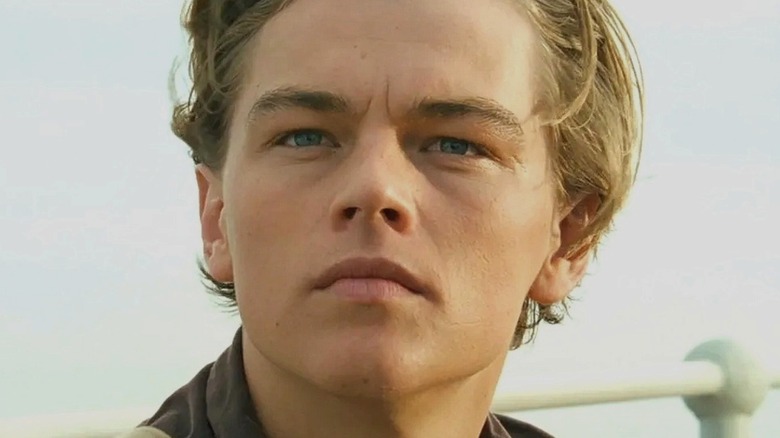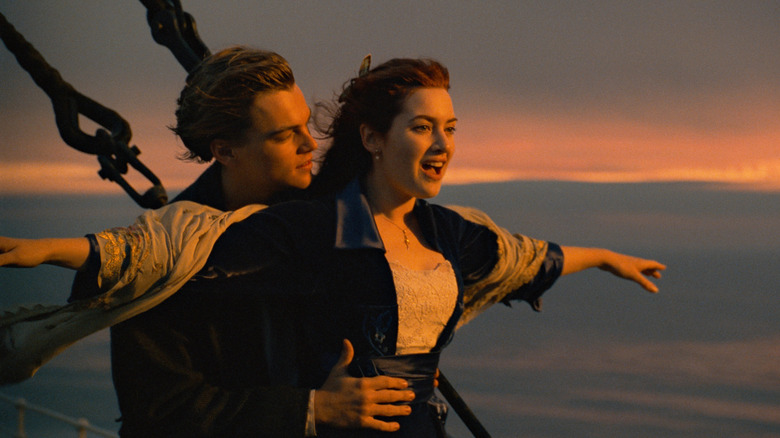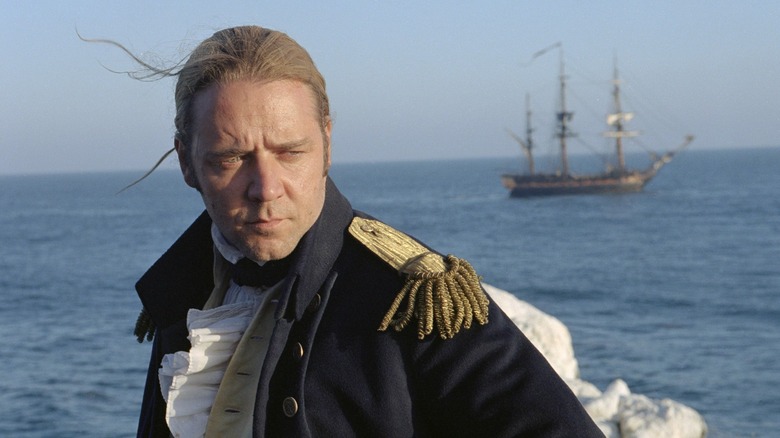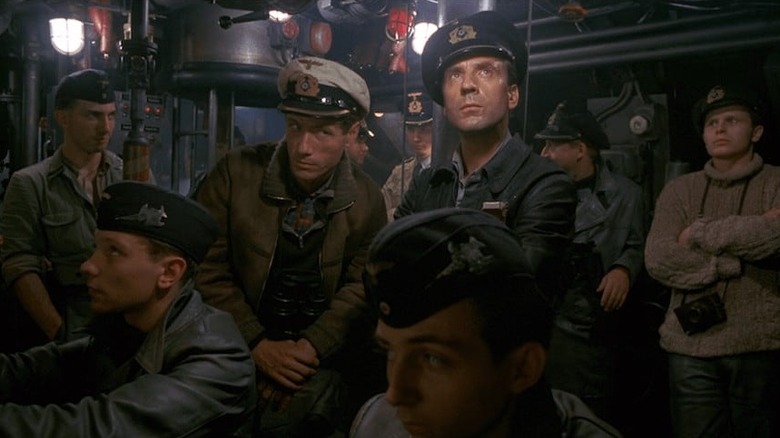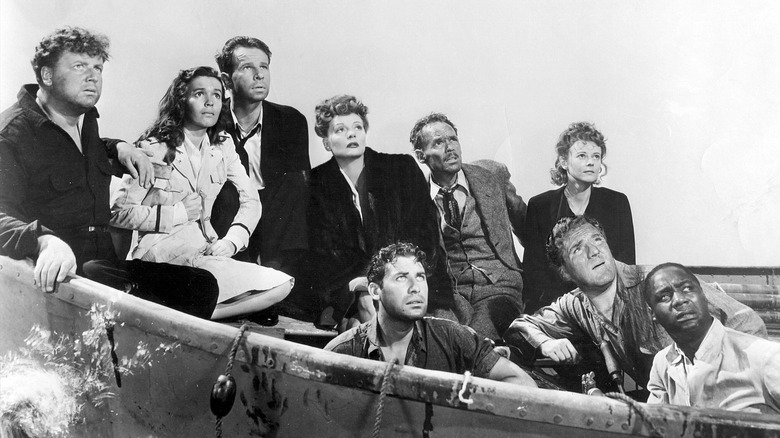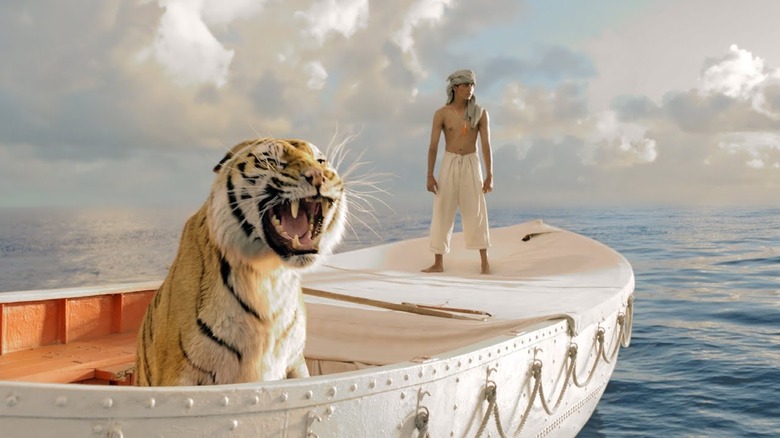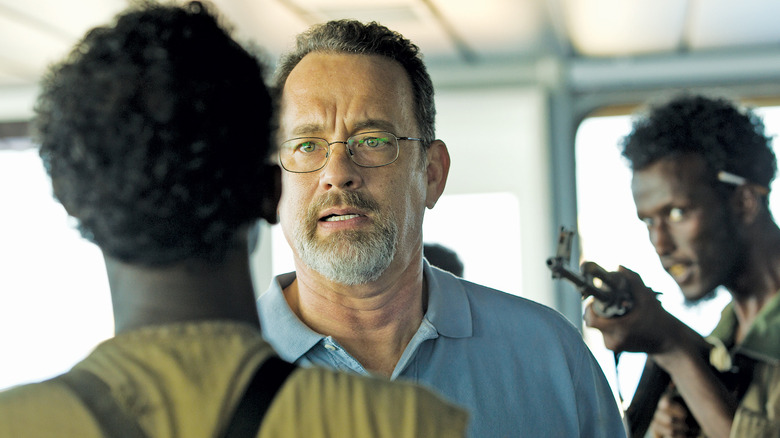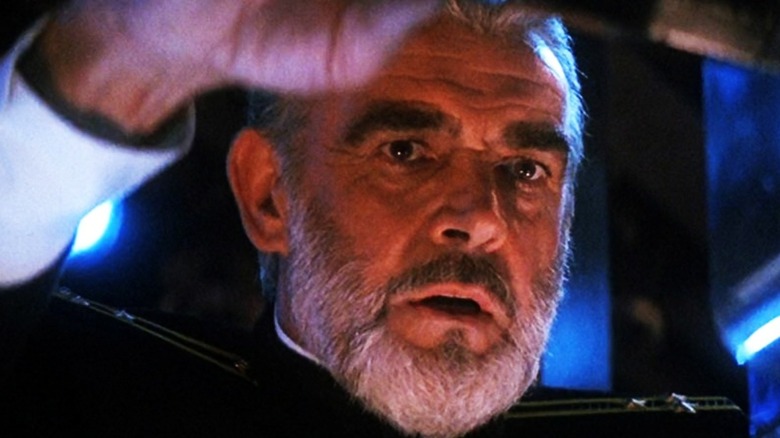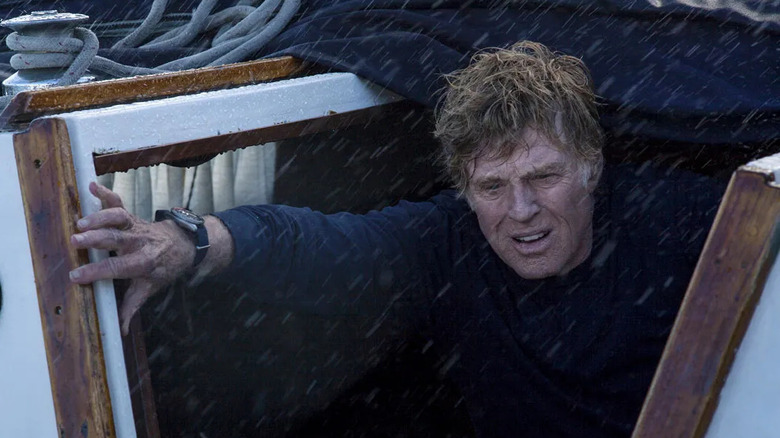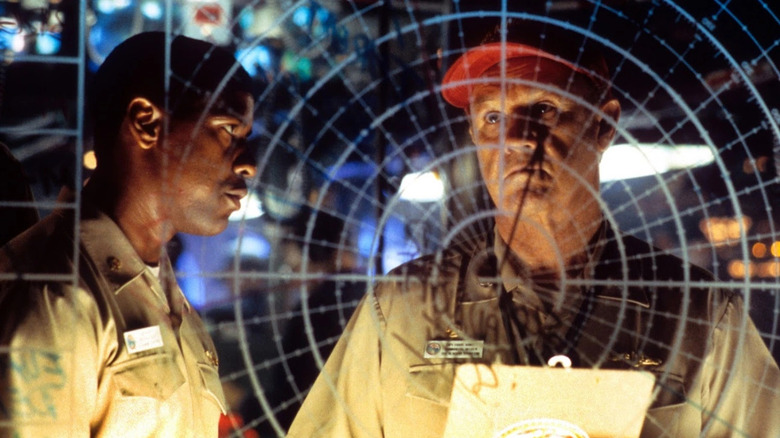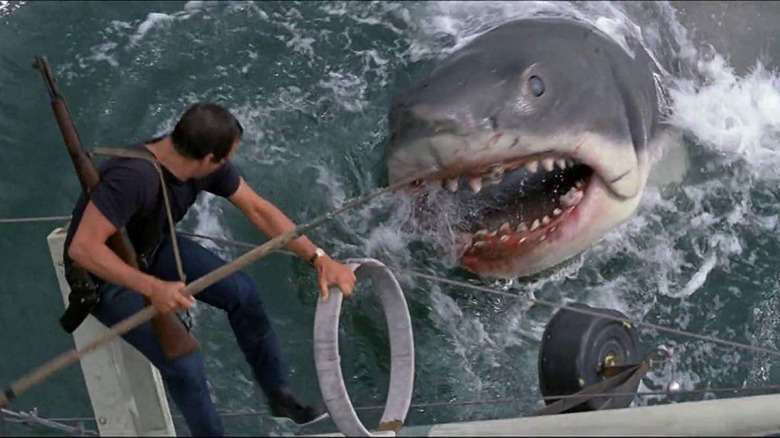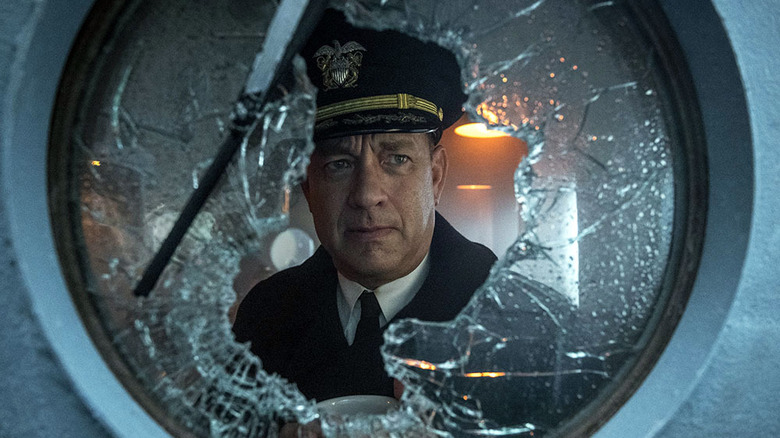The Best Movies Set Aboard Boats
Whether you're a veteran sailor or a lifelong landlubber, it's hard to deny that humanity has always been called to the sea. Whether it's the incredible vastness of the deep or the untold mysteries that it can hide from us, some of the most memorable stories in history have been set on the seven seas. As such, there's no shortage of films from every genre imaginable that have opted to make their briny waters (and humanity's preferred method of traversing them) their setting.
Whether it's drama, romance, warfare or even horror that you're after, there are definitely plenty of options to choose from. Of course, only a few can be considered truly great, which is why we'll be rounding up some of the best, most seaworthy movies set aboard boats. So batten down the hatches, raise the anchors, and pour yourself a mug of grog, because we're about to dive right into these picks.
Titanic
We'll get this one out of the way right off the bat. Neither the film nor its real world inspiration likely need any introduction at this point, as even those who weren't around to experience the box office-crushing mania that was the 1997 release of "Titanic" are surely familiar with its legacy. That said, it left its mark on cinema history for good reason, including early film roles for both Leonardo DiCaprio and Kate Winslet that propelled both to stardom. It wasn't just the beloved romance storyline that hooked audiences, though, as there truly was something for everyone in this sprawling three-hour drama. Adventure, action, and enough moments to please history buffs all combined to make "Titanic" the first film to sail past a billion dollars at the box office.
For those few who still haven't watched this cinema staple, we'll let you know what all the fuss is about. Trapped in a loveless relationship for the sake of her family's wealth that's soon to become an even worse marriage, a despondent Rose (Kate Winslet) is desperate for a way out. Enter Jack (Leonardo DiCaprio), a young, starving artist who's only aboard the luxury ocean liner by blind, dumb luck. Together, the two defy the odds and enter into a forbidden romance so captivating you might just forget what terrible fate is looming in the distance for everyone aboard the ship.
Master and Commander: Far Side of the World
A high-stakes game of cat-and-mouse would be an apt description for this 19th century seafaring epic. During the Napoleonic wars, French and British ships are duking it out across the seas and far from home. After receiving orders to take down the infamous French ship Acheron that's been harassing English ships in the area, Captain Jack Aubrey (Russell Crowe) sends his ship the HMS Surprise in pursuit off the coast of Brazil. In the dramatic first encounter between the two warships, it's immediately apparent that the Surprise is outmatched and outgunned by its adversary, leaving Aubrey and the crew of the Surprise in a fight for their lives.
"Master and Commander: The Far Side of the World" received critical acclaim upon its release, mainly thanks to its well-written story and stunning practical effects. Renowned film critic Roger Ebert said as much in his four-star review of the film, calling it "an exuberant sea adventure told with uncommon intelligence; we're reminded of well-crafted classics before the soulless age of computerized action." For all the fans who have already seen this one before, it looks like a long-awaited prequel could be getting ready to set sail.
Das Boot
It's late 1941, and far beneath the waters of the Atlantic Ocean, German U-boats are prowling sight unseen. With the primary mission of finding and sinking Allied cargo ships carrying precious supplies, the submarines are a vital part of the German war machine. Among the fleet is the battered, war-weary crew of the U-96, who are joined by newcomer and military journalist Lieutenant Werner (Herbert Grönemeyer). Werner's bright-eyed and bushy-tailed demeanor is at odds with the experienced crew he's been assigned to sail with, some of whom have entirely lost faith in the country they're fighting for. As the war drags on and the missions become more perilous for the U-96, however, Werner gradually becomes just as hardened as the rest of the crew.
Arguably one of the greatest war movies of all time, "Das Boot" is remembered as an unflinchingly accurate portrayal of what life is like during a war at sea. It's tense, claustrophobic, and undoubtedly one of late director Wolfgang Petersen's best. Overwhelmingly positive reception from fans and critics further proves the greatness of "Das Boot," making this a must watch for history and seafaring fans alike.
Lifeboat
Credited with pioneering many of the fundamentals of modern moviemaking, legendary director Alfred Hitchcock wasn't afraid to challenge himself, or audience expectations, with unconventional premises. Though the master of suspense would later go on to direct a number of films set entirely in one room, "Lifeboat" was an ambitious and early example of his skills that, as you might expect, is set entirely aboard a lifeboat adrift at sea.
Another pick focusing on combat between German U-boats and Allied shipping vessels, this one begins with a showdown between the two that winds up sending both vessels straight to the bottom of the ocean. Only a handful of men and women manage to escape the wrecks, with their only option being the relative safety of a single lifeboat.
Unique for being released while the war during which it's set was still raging on, "Lifeboat" is remembered as being one of Alfred Hitchcock's most important, and perhaps most brutal, entries. That brutality is best shown through the plight of the sole German survivor of the clash. Now forced to hold out alongside the very same people he just tried to sink, he can do nothing as many of them remark that they'd be better off throwing him overboard to join the rest of his ill-fated crew.
It's not the aforementioned seafaring battle that's the heart of the conflict in "Lifeboat." Instead, the harrowing struggle to stay alive by the survivors on both sides is what's fully explored in this 1944 classic.
Life of Pi
Similar to the plot of "Lifeboat" but entirely different in so many ways, "Life of Pi" stunned audiences upon release thanks to its imaginative story and breathtaking visuals. While sailing across the ocean, tragedy befalls a family of former zookeepers when their ship is caught in a dramatic storm. The only survivors of the wreck are their son Pi Patel (Suraj Sharma), and a handful of the family's animals. As you might expect, the situation goes from bad to worse as the animals gradually pick each other off, until the last one standing is a Bengal tiger named Richard. Together, the unlikely pair have no choice but to try and coexist on a tiny lifeboat in search of rescue. It's certainly a coming-of-age story in a sense, but also present are deeper themes of both religion and man's relationship to the world around him.
Adapted from the novel of the same name, the film has some key differences from its source material, with some of the most apparent being Pi's internal monologues and more brutally desperate situations being omitted. That said, the film succeeds in preserving both the spirit and messages of its source material, and won't disappoint those looking for an unconventional survival adventure.
Captain Phillips
The image of pirates is one that's become romanticized over the years, with films like the "Pirates of the Caribbean" series likely becoming the best-known to most of us. Past the sanitized and cinematic adventures we watch in theaters, however, the real-life problem of piracy is one that unfortunately reemerged in the 21st century. "Captain Phillips" recounts one such case, chronicling the true story of the 2009 hijacking of the Maersk Alabama and the dramatic events that followed, which made international headlines.
While sailing through waters known to be a hotspot for pirate activity, the crew of the Maersk Alabama carry out a preventative drill in preparation for a potential hijacking. Their worst fears are soon realized when, during the drill, the ship's captain, Richard Phillips (Tom Hanks), notices that they're being pursued by two small boats. Despite their best efforts to repel the marauders, the container ship and its crew succumb to the boarding party, becoming the first American vessel to be captured by pirates in almost two centuries. The attack marks the start of a nail-biting affair that lasts nearly a week, and ends in a dramatic last stand between the hijackers and a team of elite Navy snipers. Now nearly a decade old, "Captain Phillips" remains a must-watch for anyone searching for a tense thriller. It's certainly one of the best to take place on the high seas.
The Hunt for Red October
After giving us some of the most iconic action movies of the '80s like "Predator" and "Die Hard," acclaimed director John McTiernan would follow them up just two years later with "The Hunt for Red October." The first film adaptation of a Tom Clancy novel, the exciting tale of espionage is set during the height of the Cold War, also in the '80s and just a few years before it was released in theaters.
After senior Soviet naval officer Marko Ramius (Sean Connery) seemingly goes rogue while in command of a new and incredibly stealthy submarine, naval forces from both sides of the Iron Curtain find themselves in hot pursuit. Believing that Ramius may be plotting a devastating strike on American soil, the U.S. government assigns CIA agent Jack Ryan (Alec Baldwin) to spearhead the efforts to stop the nuclear-armed sub. The only catch is that Ryan's unconvinced that they have the renegade officer's true motives pinned down.
Great action and genuine tension are typically enough to keep a movie afloat, but "The Hunt for Red October" has a star-studded cast to boot. In addition to the aforementioned Sean Connery and Alec Baldwin, James Earl Jones of "Star Wars" fame has a part as James Greer, Deputy Director of the CIA, in one of his all-time best roles.
All is Lost
It's hard to imagine a real-world scenario more terrifying than being lost in the ocean. The gradual dwindling of much-needed resources, as well as the complete isolation that's rarely equaled anywhere else on the planet, make every tale of survival at sea a harrowing ordeal. It's also a far from easy premise to translate into film, especially if the story being told has only a single character and almost as few lines. Despite the challenges, though, "All is Lost" is possibly one of the most compelling films in the genre, and one that can give any other survival film out there a run for its money.
While sailing alone across the Indian Ocean, disaster strikes our unnamed protagonist (Robert Redford) after his small boat collides with ocean debris. Now taking on water, he has no choice but to desperately try and keep his watercraft afloat in the remote stretch of sea. It's far from the only tragedy to befall his voyage, though, as nature and a run of bad luck join forces to throw just about every setback imaginable at our unfortunate mariner. Near-unanimous critical praise was at odds with lukewarm audience reception on this one, but if you're looking for a treacherous tale of survival at all costs, "All is Lost" will reel you in.
Crimson Tide
If you haven't noticed by now, some of the most compelling nautical films happen to be set aboard submarines. There are good reasons for it — the cramped confines of a sub and the ever-present psychological dread of being deep below the ocean's surface combine to make them one of the most gripping settings for a film imaginable. "Crimson Tide" is just another example of what makes the genre so ripe for storytelling, focusing on the internal tension between submarine officers at a time of grave danger to far more than just their crew.
It's the mid-'90s, and the collapse of the Soviet Union results in Russia slipping into a civil war. Amidst the chaos, an extremist sect of the Russian rebellion captures a nuclear base, threatening to unleash world-ending weapons if provoked. Far from the crisis, a U.S. Navy submarine carrying nuclear missiles of its own is ordered to launch a first strike against the rebels, only for a follow-up message to be received but unreadable. The two most senior officers now stand divided, with the headstrong Captain Frank Ramsey (Gene Hackman) wanting to launch, and the more restrained Lieutenant Commander Ron Hunter (Denzel Washington) wanting to delay the attack. Unable to reach an agreement, their dispute extends throughout the crew, raising tensions to an all-time high as both sides risk everything to get their way.
Jaws
One of the earliest films directed by now-legendary filmmaker Steven Spielberg, "Jaws" has become an undeniable cultural icon ever since its release. Yet there's probably still a lot about this 1975 classic that you didn't know about. Between constant trouble behind the scenes, thanks to both the human actors and the animatronic antagonist, it's a wonder that the final product turned out as well as it did. Monster movies were definitely nothing new even at the time, but Spielberg's early talents as a director helped elevate this one above the rest of the B-movie schlock audiences were used to and into the history books.
After a particularly bloody and not all that mysterious death occurs off the coast of a popular tourist beach, investigators and the local government butt heads over what to do. Afraid of losing all of their summer revenue, the town's mayor (Murray Hamilton) convinces the powers-that-be to sweep the grisly scene under the rug. It's only after more deaths occur that police chief Martin Brody (Roy Scheider), shark hunter Quint (Robert Shaw) and scientist Matt Hooper (Richard Dreyfuss) set sail on Quint's boat, hoping to stop the goliath shark for good. The film's final third, in which the three men must face a relentless force of nature on a tiny, creaking, leaking boat, is as riveting as cinema can get.
Greyhound
"Greyhound" is set during the earliest days of American involvement in World War II, with the battle of the Atlantic in full swing. A combined force of Allied vessels is struggling against the German Navy to wrest control of the waters, all while also trying to protect valuable transport ships bound for England. At the helm of one of the Allied vessels, as well as the entire convoy, is Commander Ernest Krause (Tom Hanks) of the titular Greyhound, a U.S. Navy destroyer that can counter German U-boats. While an experienced commander, Krause has never been tasked with crossing the Atlantic until now, making the mission exceptionally perilous for all those depending on his leadership to survive.
Though it never got its planned theatrical release, "Greyhound" is one of the latest examples of a war film done right, and one that's the embodiment of everything that makes the genre so entertaining. There's little in the way of melodrama throughout its concise 91-minute runtime, instead focusing on the procedural tension and related struggles of naval combat. Plus a predictably solid performance by beloved actor Tom Hanks in perhaps one of his best roles since "Saving Private Ryan" makes "Greyhound" an underrated gem.
Triangle
Though it gets off to a similar start as some of our other tales of being stranded at sea, "Triangle" pretty quickly ends up taking an entirely different turn. The film follows a group of friends who embark on a seemingly normal sailing trip aboard a privately owned yacht. Their pleasure cruise winds up turning sour, however, when a freak storm descends upon the small sailing vessel. Now clinging for life on the overturned boat, it seems the troubles have finally come to an end for our survivors in the form of a passing ocean liner. In reality, they've only just begun.
We won't spoil exactly what the driving force behind the chaos in "Triangle" is, but rest assured it's definitely a mind-bender. Top that off with its claustrophobic setting and some truly unpredictable elements, and you've got the foundation for a thoroughly terrifying trip we wouldn't want to take. Being the only pick on our list firmly within the category of horror, "Triangle" is one that's sure to shiver your timbers.
